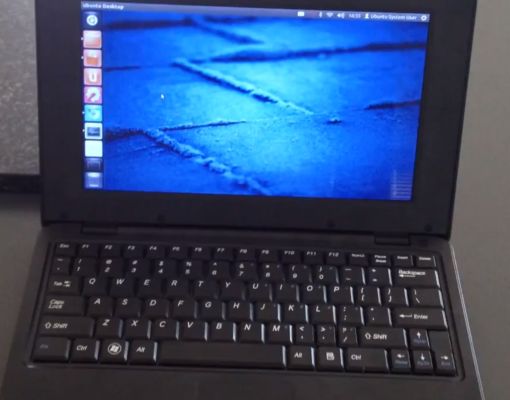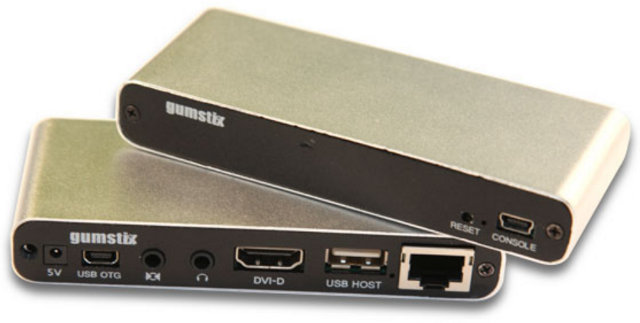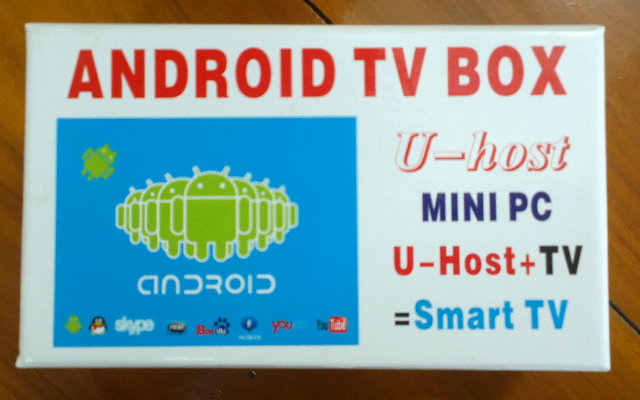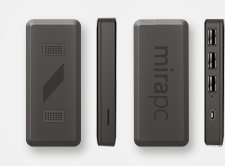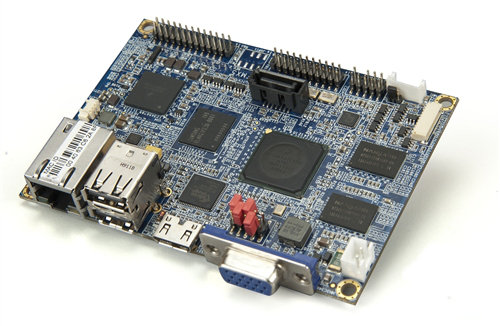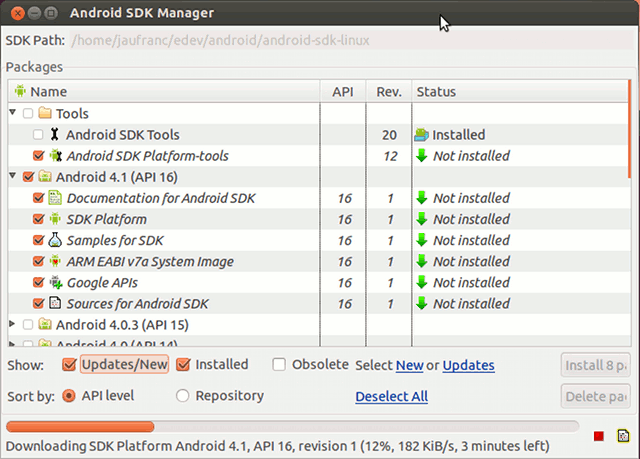Rikomagic, the company that sells the MK802 mini PC, is planning to sell a netbook based on AllWinner A10 processor that runs both Android and Ubuntu operating systems. This device looks very much like the H6 netbook with a 10″ 1024×600 display, 1 GB RAM, 4 to 8 GB flash. an SD card slot, 3 USD ports, audio in/out and a front camera. Android currently runs in the internal flash, and Ubuntu can be booted from an SD card. In the video below, Andy Kirby of Rikomagic gives an overview of the netbook and shows a demo of Ubuntu Desktop running from an SD card. The Linux OS seems to run relatively smoothly as he shows pages rendered in Chromium.However, hardware acceleration (both OpenGL and VE) is missing, and Youtube video playback is very slow as it is rendering in software. Open Office is also a bit slow, but it’s […]
AllWinner A10 Initramfs Support and Linaro 12.07 Image
An initramfs is a minimal root filesystem that is loaded at an early stage of the boot process, before the rootfs partition is mounted. This is optional but is now used by many Linux distributions such as Ubuntu in order to speed up boot time among others things. Up to recently, there was no support for this in the AllWinner A10 nightly builds, and there would be lot of error messages due to ureadahead process with Ubuntu, but I’ve changed that by: Using a boot.scr file (U-Boot Script) for each supported device in order to either follow the default init boot method or do an initramfs boot if uInitrd file is present in the FAT partition. Adding a script (a1x-initramfs.sh) to generate and install uInitrd initramfs in the rootfs. The initramfs can’t be generated at build time since the hardware packs are (mostly) distribution agnostic. If you want an initramfs, […]
Gumstix Waysmall Silverlode Linaro Ubuntu Computer based on TI Sitara AM3703
Gumstix has just announced the Waysmall Silverlode computer, a small form factor device running Linaro ARM optimized Ubuntu and designed for developers of commercial and industrial applications such as digital signage players and remote servers. It’s based on Overo EarthSTORM Computer-on-Module (Texas Instruments Sitara AM3703 @ 1 GHz, 512MB Flash and 512MB RAM) and consumes less than 2.5 W. Here are the specs of the device: Processor Texas Instruments Sitara AM3703 processor (ARM Cortex-A8 ) @ 1 GHz 800 MHz is recommended for reliable performance System Memory 512 MB RAM Storage 512 MB NAND flash microSD card slot Video Output HDMI (DVI-D) Audio I/O Stereo Audio In /Out jacks Connectivity 10/100Mb Ethernet USB USB Host, USB OTG and USB Console Connectors 2 x 70-pin AVX connectors 1 x 27-pin Hirose camera connector Battery holder for 6mm rechargeable coin Dimensions 11.0 x 4 .4 x 1.8 cm Power 5V The computer […]
Smallart U-Host mini PC Unboxing and Review
I’ve just received a Smallart Uhost mini PC based on AllWinner A10 from the “The Cubies hacker shop” on Aliexpress. The device features 1GB RAM, 4B flash, includes 802.11 b/g/n built-in, USB ports, HDMI output and a microSD card. It costs $70 including shipping. I received the device in the simple package below. There is a whole bunch of stuffs inside the package. A USB to mini USB cable for power and to connect the device to PC to act as a USB drive, the Smallart U-host mini PC itself, a user manual in English, the power supply 5V/2A with a USB port, an HDMI female to male cable. The USB to mini USB cable has actually 2 large USB connector in order to provide up to 5W power (2 x 500mA x 5V). The mini PC has several connectors including an HDMI male connector, a USB Host port (for […]
Linaro 12.07 Release with Kernel 3.5 and Android 4.0.4
Linaro has released version 12.07 based on Linux Kernel 3.5-rc3 and Android 4.0.4. Some work has been done on Jelly Bean (but the port is for next month), several benchmark tools have been added to LAVA as Linaro wants to provide standard benchmarks for Android, Linaro ALIP image now uses LXDE by default with a smaller image and improved performance, and Open Embedded images are now available (minimal and LAMP stack). Here are the highlights of the release: Android Jellybean baselines for Galaxy and Panda with Linaro extra’s available Android Benchmarking apps were deployed for pandaboard, snowball and origen in LAVA including: vellamo, quadrant, nbench, linpack, glbenchmark, geekbench, caffeinemark, antutu, andebench Improved native Benchmarks variance on Android to 1%, working on Java variance ICS “tests” builds now produced by default and test lists generated Open overlay tarballs working pm-qa’s cpuidle cpufreq cpuhotplug sched_mc suspend integrated into the Android builds Linaro […]
Stella Mira Pocket Console AllWinner A10 mini PC with Built-in Bluetooth and Up to 128 GB Flash
Stella Mira, a new technology startup, has come up with a new Android mini-PC based on AllWinner A10 (how original!) called the Pocket Console (aka MiraPC). What makes it stand apart is that it comes with built-in Bluetooth, has several versions based on the NAND flash size: 8GB, 16GB, 32GB, 64 GB and even 128 GB, and the company plans to release a 3G version in September. The company also provides a dock, the Stella Mira Pocket Dock, that comes pre-loaded with one of supported Linux distributions, without the requiring the knowledge and time to configure microSD card for Linux. The company will provide 4 Linux distributions: Ubuntu 12.04 (Custom build – Ready) Lubuntu 12.04 (Custom build – Ready) Xubuntu 12.04 (Custom build – Final stage of development) Fedora 17 XFCE (Not officially supported, but backed by a large development community) Beside running Linux, the Pocket Console can also “run […]
VIA Announces VIA VAB-800 Pico-ITX Board Based on Freescale i.MX537 Processor
VIA Technologies has announced the VIA VAB-800 Pico-ITX board powered by a Freescale i.MX537 (ARM Cortex A8) processor clocked at 800MHz or 1GHz depending on the requirements, with 1GB DDR3-800 SDRAM and support for eMMC Flash with a capacity of up to 64 GB. The VIA VAB-800 is an industrial board that can operate in a wide temperature range and targets high-end industrial and in-vehicle embedded applications. Here are the specs of the board: Processor – Freescale Cortex-A8 single core iMX537 @800MHz System Memory – 1GB DDR3-800 SDRAM, using 128M x16 memory devices Flash – eMMC Flash, up to 64GB Graphics – Supports two independent, integrated graphics processing units: an OpenGL® ES 2.0, 3D graphics accelerator and an OpenVG™ 1.1 2D graphics accelerator Ethernet – SMSC LAN8720A 10/100 PHY transceiver with HP Auto-MDIX support Audio – Freescale SGTL5000 low power stereo codec with headphone amp HDMI – Silicon image SiI9024A […]
Installing Android SDK on Ubuntu 12.04
The official instructions to install Android SDK do not appear to be really up-to-date for Ubuntu 12.04, so I’ll post how I’ve installed the Android SDK and Eclipse on Ubuntu 12.04. First download and decompress Android SDK for Linux:
|
1 2 |
wget http://dl.google.com/android/android-sdk_r20-linux.tgz tar xzvf android-sdk_r20-linux.tgz |
on 64-bit Ubuntu:
|
1 |
apt-get install ia32-libs |
Sun Java is not part of Ubuntu packages anymore, so you’ll need to use openjdk instead
|
1 |
apt-get install openjdk-6-jdk |
Now install the SDK
|
1 2 |
cd android-sdk-linux/tools ./android sdk |
Android SDK Manager should show up. Use the default recommended packages and platforms, as well as any extra packages you may need, and click on Install x packages, accept all licenses and after installation is complete, the Android SDK is installed. Eclipse IDE is optional, but it’s the most widely used IDE to develop Android apps. You can install Eclipse as follows:
|
1 |
sudo apt-get install eclipse-jdt |
Once both Android packages and platforms, and eclipse are installed, start eclipse:
|
1 |
eclipse |
Then in the top menu, click on Help->Install […]


